2023
|
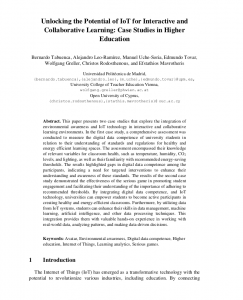 | BernardoTabuenca,; Leo-Ramirez, Alejandro; Uche-Soria, Manuel; Tovar, Edmundo; Greller, Wolfgang; Rodosthenous, Christos; Mavrotheris, Efstathios Unlocking the Potential of IoT for Interactive and Collaborative Learning: Case Studies in Higher Education Proceedings 2023, ISBN: 978-3-031-53022-7. @proceedings{icl2023,
title = {Unlocking the Potential of IoT for Interactive and Collaborative Learning: Case Studies in Higher Education},
author = {BernardoTabuenca and Alejandro Leo-Ramirez and Manuel Uche-Soria and Edmundo Tovar and Wolfgang Greller and Christos Rodosthenous and Efstathios Mavrotheris},
editor = { Michael E. Auer and Uriel R. Cukierman and Eduardo Vendrell Vidal and Edmundo Tovar Caro},
url = {https://www.christosrodosthenous.info/wp-content/uploads/2023/10/1252.pdf},
doi = {10.1007/978-3-031-53022-7_43},
isbn = {978-3-031-53022-7},
year = {2023},
date = {2023-09-29},
urldate = {2023-09-29},
booktitle = {Proceedings of the 26th International Conference on Interactive Collaborative Learning},
abstract = {This paper presents two case studies that explore the integration of environmental awareness and IoT technology in interactive and collaborative learning environments. In the first case study, a comprehensive assessment was conducted to measure the digital data competence of university students in relation to their understanding of standards and regulations for healthy and energy efficient learning spaces. The assessment encompassed their knowledge of relevant variables for classroom health, such as temperature, humidity, CO2 levels, and lighting, as well as their familiarity with recommended energy-saving thresholds. The results highlighted gaps in digital data competence among the participants, indicating a need for targeted interventions to enhance their understanding and awareness of these standards. The results of the second case study demonstrated the effectiveness of the serious game in promoting student engagement and facilitating their understanding of the importance of adhering to recommended thresholds. By integrating digital data competence, and IoT technology, universities can empower students to become active participants in creating healthy and energy-efficient classrooms. Furthermore, by utilizing data from IoT systems, students can enhance their skills in data management, machine learning, artificial intelligence, and other data processing techniques. This integration provides them with valuable hands-on experience in working with real-world data, analyzing patterns, and making data-driven decisions.},
keywords = {e-learning, Environmental Education},
pubstate = {published},
tppubtype = {proceedings}
}
This paper presents two case studies that explore the integration of environmental awareness and IoT technology in interactive and collaborative learning environments. In the first case study, a comprehensive assessment was conducted to measure the digital data competence of university students in relation to their understanding of standards and regulations for healthy and energy efficient learning spaces. The assessment encompassed their knowledge of relevant variables for classroom health, such as temperature, humidity, CO2 levels, and lighting, as well as their familiarity with recommended energy-saving thresholds. The results highlighted gaps in digital data competence among the participants, indicating a need for targeted interventions to enhance their understanding and awareness of these standards. The results of the second case study demonstrated the effectiveness of the serious game in promoting student engagement and facilitating their understanding of the importance of adhering to recommended thresholds. By integrating digital data competence, and IoT technology, universities can empower students to become active participants in creating healthy and energy-efficient classrooms. Furthermore, by utilizing data from IoT systems, students can enhance their skills in data management, machine learning, artificial intelligence, and other data processing techniques. This integration provides them with valuable hands-on experience in working with real-world data, analyzing patterns, and making data-driven decisions. |
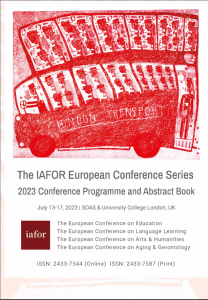 | Mavrotheris, Efstathios; Vekiri, Ioanna; Meletiou-Mavrotheris, Maria; Hadjithoma, Leoni; Lazoudis, Angelos; Rodosthenous, Christos High School Teachers’ Reflections on the Design and Implementation of STEAM Education Scenarios in Their Classrooms Conference European Conference on Education (ECE) 2023, 2023, ISSN: 2433-7544. @conference{nokey,
title = {High School Teachers’ Reflections on the Design and Implementation of STEAM Education Scenarios in Their Classrooms},
author = {Efstathios Mavrotheris and Ioanna Vekiri and Maria Meletiou-Mavrotheris and Leoni Hadjithoma and Angelos Lazoudis and Christos Rodosthenous},
issn = {2433-7544},
year = {2023},
date = {2023-07-16},
urldate = {2023-07-16},
booktitle = {European Conference on Education (ECE) 2023},
abstract = {STEAM education is a new pedagogical approach that combines STEM (Science, Technology, Engineering, & Mathematics) and Arts subjects, to improve student creativity and other important 21st century skills, attract more students to STEM/STEAM fields and increase innovation (Perignat & Katz-Buonincontro, 2019). Authentic, problem-based approaches to learning, and the transdisciplinary integration of STEAM subjects are key features of STEAM pedagogy (Quigley et al., 2017), requiring collaboration among students but also among teachers who have different content area specializations.
Despite the potential of STEAM education, research on teacher perceptions and classroom practices is limited (Herro et al., 2019). The proposed paper will contribute to this literature by presenting a study that involved focus group interviews with high school teachers from two schools located in two different EU countries, who designed and/or implemented STEAM education scenarios for the first time, after attending an online professional development course. The study was carried out in the context of an Erasmus+ project which aimed at the integration of immersive technologies in STEAM education by promoting the interdisciplinary collaboration between teachers, researchers, and university students.
Teachers were asked to discuss and reflect on their experiences during their participation in the project and, more specifically, on the development of their views on transdisciplinary STEAM education, and the challenges and benefits of designing and implementing STEAM teaching in their classrooms. Data analysis showed that although teachers had prior experiences with inquiry- and problem-based pedagogical approaches, both designing and teaching transdisciplinary educational scenarios was an important challenge for them.},
keywords = {},
pubstate = {published},
tppubtype = {conference}
}
STEAM education is a new pedagogical approach that combines STEM (Science, Technology, Engineering, & Mathematics) and Arts subjects, to improve student creativity and other important 21st century skills, attract more students to STEM/STEAM fields and increase innovation (Perignat & Katz-Buonincontro, 2019). Authentic, problem-based approaches to learning, and the transdisciplinary integration of STEAM subjects are key features of STEAM pedagogy (Quigley et al., 2017), requiring collaboration among students but also among teachers who have different content area specializations.
Despite the potential of STEAM education, research on teacher perceptions and classroom practices is limited (Herro et al., 2019). The proposed paper will contribute to this literature by presenting a study that involved focus group interviews with high school teachers from two schools located in two different EU countries, who designed and/or implemented STEAM education scenarios for the first time, after attending an online professional development course. The study was carried out in the context of an Erasmus+ project which aimed at the integration of immersive technologies in STEAM education by promoting the interdisciplinary collaboration between teachers, researchers, and university students.
Teachers were asked to discuss and reflect on their experiences during their participation in the project and, more specifically, on the development of their views on transdisciplinary STEAM education, and the challenges and benefits of designing and implementing STEAM teaching in their classrooms. Data analysis showed that although teachers had prior experiences with inquiry- and problem-based pedagogical approaches, both designing and teaching transdisciplinary educational scenarios was an important challenge for them. |
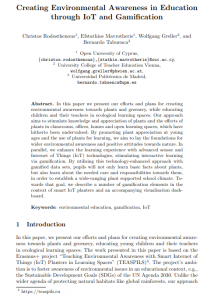 | Rodosthenous, Christos; Mavrotheris, Efstathios; Greller, Wolfgang; Tabuenca, Bernardo Creating Environmental Awareness in Education through IoT and Gamification Proceedings Article In: E., Auer Michael; Wolfgang, Pachatz; Tiia, Rüütmann (Ed.): Learning in the Age of Digital and Green Transition. ICL 2022. , pp. 657–668, Springer International Publishing, Cham, 2023, ISBN: 978-3-031-26190-9. @inproceedings{rodosthenous2022icl2022,
title = {Creating Environmental Awareness in Education through IoT and Gamification},
author = {Christos Rodosthenous and Efstathios Mavrotheris and Wolfgang Greller and Bernardo Tabuenca},
editor = {Auer Michael E. and Pachatz Wolfgang and Rüütmann Tiia},
url = {https://www.christosrodosthenous.info/wp-content/uploads/2023/10/978-3-031-26190-9_69.pdf},
doi = {10.1007/978-3-031-26190-9_69},
isbn = {978-3-031-26190-9},
year = {2023},
date = {2023-02-23},
urldate = {2023-02-23},
booktitle = {Learning in the Age of Digital and Green Transition. ICL 2022. },
pages = {657--668},
publisher = {Springer International Publishing},
address = {Cham},
series = {Lecture Notes in Networks and Systems},
abstract = {In this paper, we present our efforts and plans for creating environmental awareness towards plants and greenery, while educating children and their teachers in ecological learning spaces. Our approach aims to stimulate knowledge and appreciation of plants and the effects of plants in classrooms, offices, homes and open learning spaces, which have hitherto been undervalued. By promoting plant appreciation at young ages and the use of plants for learning, we aim to lay the foundations for wider environmental awareness and positive attitudes towards nature. In parallel, we enhance the learning experience with advanced sensor and Internet of Things (IoT) technologies, stimulating interactive learning via gamification. Utilising this technology-enhanced approach with gamified data sets, pupils will not only learn basic facts about plants, but also learn about the needed care and responsibilities towards them, in order to establish a wide-ranging plant supported school climate. Towards that goal, we describe a number of gamification elements in the context of smart IoT planters and an accompanying visualisation dashboard.},
keywords = {Environmental Education, Gamification, IoT},
pubstate = {published},
tppubtype = {inproceedings}
}
In this paper, we present our efforts and plans for creating environmental awareness towards plants and greenery, while educating children and their teachers in ecological learning spaces. Our approach aims to stimulate knowledge and appreciation of plants and the effects of plants in classrooms, offices, homes and open learning spaces, which have hitherto been undervalued. By promoting plant appreciation at young ages and the use of plants for learning, we aim to lay the foundations for wider environmental awareness and positive attitudes towards nature. In parallel, we enhance the learning experience with advanced sensor and Internet of Things (IoT) technologies, stimulating interactive learning via gamification. Utilising this technology-enhanced approach with gamified data sets, pupils will not only learn basic facts about plants, but also learn about the needed care and responsibilities towards them, in order to establish a wide-ranging plant supported school climate. Towards that goal, we describe a number of gamification elements in the context of smart IoT planters and an accompanying visualisation dashboard. |
2022
|
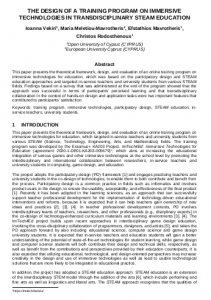 | Vekiri, Ioanna; Meletiou-Mavrotheris, Maria; Mavrotheris, Stathis; Rodosthenous, Christos The Design of a Training Program on Immersive Technologies in Transdisciplinary STEAM Education Proceedings Article In: Proceedings of the 14th annual International Conference on Education and New Learning Technologies, pp. 9804-9809, IATED, 2022, ISSN: 2340-1117. @inproceedings{vekiri2022edulearn,
title = {The Design of a Training Program on Immersive Technologies in Transdisciplinary STEAM Education},
author = {Ioanna Vekiri and Maria Meletiou-Mavrotheris and Stathis Mavrotheris and Christos Rodosthenous},
url = {https://www.christosrodosthenous.info/wp-content/uploads/2022/05/EDULEARN_Design_Training_Program_on_ImTech4Ed__Final_12.5.pdf
https://dx.doi.org/10.21125/edulearn.2022.2368},
doi = {10.21125/edulearn.2022.2368},
issn = {2340-1117},
year = {2022},
date = {2022-07-06},
urldate = {2022-07-06},
booktitle = {Proceedings of the 14th annual International Conference on Education and New Learning Technologies},
pages = {9804-9809},
publisher = {IATED},
series = {14th International Conference on Education and New Learning Technologies},
keywords = {immersive technologies, in-service teachers, participatory design, STEAM education, training program, university students},
pubstate = {published},
tppubtype = {inproceedings}
}
|
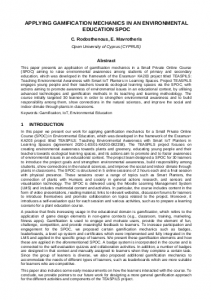 | Rodosthenous, Christos; Mavrotheris, Stathis Applying Gamification Mechanics in an Environmental Education SPOC Proceedings Article In: Proceedings of the 14th annual International Conference on Education and New Learning Technologies, pp. 9818-9825, IATED, 2022. @inproceedings{rodosthenous2022edulearn,
title = { Applying Gamification Mechanics in an Environmental Education SPOC},
author = {Christos Rodosthenous and Stathis Mavrotheris},
url = {https://www.christosrodosthenous.info/wp-content/uploads/2022/05/APPLYING_GAMIFICATION_MECHANICS_IN_AN_ENVIRONMENTAL_EDUCATION_SPOC.pdf
https://dx.doi.org/10.21125/edulearn.2022.2370},
doi = {10.21125/edulearn.2022.2370},
year = {2022},
date = {2022-07-04},
urldate = {2022-07-04},
booktitle = {Proceedings of the 14th annual International Conference on Education and New Learning Technologies},
pages = {9818-9825},
publisher = {IATED},
series = {14th International Conference on Education and New Learning Technologies},
abstract = {In this paper we present our work for applying gamification mechanics for an environmental Education Small Private Online Course (SPOC) in the framework of the Erasmus+ project titled “Teaching Environmental Awareness with Smart IoT Planters in Learning Spaces”. The TEASPILS project focuses on creating environmental awareness towards plants and greenery, educating young people and their teachers towards ecological learning spaces. The project’s actions will promote and foster awareness of environmental issues in an educational context. The project team designed a SPOC for 30 learners to introduce the project goals and strengthen environmental awareness, build responsibility among students, show connections in the natural sciences, and improve the social and indoor climate through plants in classrooms. The SPOC is delivered in 5 online sessions of 2 hours each and a final session in physical presence. These sessions cover a range of topics such as Planters, the connection of plants with Humans and society in general actions research, and sensors and visualization technology. The SPOC is delivered using the Moodle Learning Management System and includes multimodal content and activities. In particular, the course includes content in the form of video presentations, reading material, links to relevant websites, discussion forums for learners to introduce themselves and promote collaboration on topics related to the project. Moreover, the course introduces a self-evaluation quiz for each session and activities, such as to prepare a learning scenario for a plant education course.
A practice that finds increasing usage in the educational domain is Gamification, which refers to the application of game design elements in non-game contexts (e.g., classroom, training, marketing, fitness apps). Gamification is used to engage and motivate users, provide the element of fun, challenge, competition, and provide meaningful feedback to learners. To increase participation and engagement for the SPOC, we proposed certain gamification mechanics, including badges, leaderboards, a level up system and certificates which were implemented and fully integrated in the LMS and applied in the specific group of learners. We present these gamification elements and how these are applied in the aforementioned SPOC. A badge system is incorporated in the course and connected to the self-evaluation quizzes and collaboration activities. In addition, a number of badges are designed in that context and manually assigned to learners when they complete a certain task. Since the group of learners is diverse, we also proposed other gamification mechanics to accommodate the needs of different types of learners, such as leaderboards which are more suitable for learners who are antagonistic.
Our work also includes statistics on how the learners interacted with the course and a mapping of our learners with the corresponding player type, based on Marczewki’s user type hexad, which is used to identify proper gamification mechanics for each user type. To conclude, we also provide pointers to our future work for designing a gamification approach for the different activities and components of the TEASPILS project.},
keywords = {Environmental Education, Gamification, IoT},
pubstate = {published},
tppubtype = {inproceedings}
}
In this paper we present our work for applying gamification mechanics for an environmental Education Small Private Online Course (SPOC) in the framework of the Erasmus+ project titled “Teaching Environmental Awareness with Smart IoT Planters in Learning Spaces”. The TEASPILS project focuses on creating environmental awareness towards plants and greenery, educating young people and their teachers towards ecological learning spaces. The project’s actions will promote and foster awareness of environmental issues in an educational context. The project team designed a SPOC for 30 learners to introduce the project goals and strengthen environmental awareness, build responsibility among students, show connections in the natural sciences, and improve the social and indoor climate through plants in classrooms. The SPOC is delivered in 5 online sessions of 2 hours each and a final session in physical presence. These sessions cover a range of topics such as Planters, the connection of plants with Humans and society in general actions research, and sensors and visualization technology. The SPOC is delivered using the Moodle Learning Management System and includes multimodal content and activities. In particular, the course includes content in the form of video presentations, reading material, links to relevant websites, discussion forums for learners to introduce themselves and promote collaboration on topics related to the project. Moreover, the course introduces a self-evaluation quiz for each session and activities, such as to prepare a learning scenario for a plant education course.
A practice that finds increasing usage in the educational domain is Gamification, which refers to the application of game design elements in non-game contexts (e.g., classroom, training, marketing, fitness apps). Gamification is used to engage and motivate users, provide the element of fun, challenge, competition, and provide meaningful feedback to learners. To increase participation and engagement for the SPOC, we proposed certain gamification mechanics, including badges, leaderboards, a level up system and certificates which were implemented and fully integrated in the LMS and applied in the specific group of learners. We present these gamification elements and how these are applied in the aforementioned SPOC. A badge system is incorporated in the course and connected to the self-evaluation quizzes and collaboration activities. In addition, a number of badges are designed in that context and manually assigned to learners when they complete a certain task. Since the group of learners is diverse, we also proposed other gamification mechanics to accommodate the needs of different types of learners, such as leaderboards which are more suitable for learners who are antagonistic.
Our work also includes statistics on how the learners interacted with the course and a mapping of our learners with the corresponding player type, based on Marczewki’s user type hexad, which is used to identify proper gamification mechanics for each user type. To conclude, we also provide pointers to our future work for designing a gamification approach for the different activities and components of the TEASPILS project. |
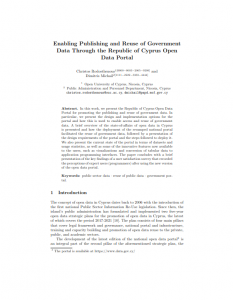 | Rodosthenous, Christos; Michail, Dimitris Enabling Publishing and Reuse of Government Data Through the Republic of Cyprus Open Data Portal Proceedings Article In: Garoufallou, Emmanouel; Ovalle-Perandones, María-Antonia; Vlachidis, Andreas (Ed.): Metadata and Semantic Research, pp. 292–303, Springer International Publishing, Cham, 2022, ISBN: 978-3-030-98876-0. @inproceedings{10.1007/978-3-030-98876-0_26,
title = {Enabling Publishing and Reuse of Government Data Through the Republic of Cyprus Open Data Portal},
author = {Christos Rodosthenous and Dimitris Michail},
editor = {Emmanouel Garoufallou and María-Antonia Ovalle-Perandones and Andreas Vlachidis},
url = {https://link.springer.com/chapter/10.1007/978-3-030-98876-0_26},
isbn = {978-3-030-98876-0},
year = {2022},
date = {2022-04-01},
urldate = {2022-04-01},
booktitle = {Metadata and Semantic Research},
pages = {292--303},
publisher = {Springer International Publishing},
address = {Cham},
abstract = {In this work, we present the Republic of Cyprus Open Data Portal for promoting the publishing and reuse of government data. In particular, we present the design and implementation options for the portal and how this is used to enable access and reuse of government data. A brief overview of the state-of-affairs of open data in Cyprus is presented and how the deployment of the revamped national portal facilitated the reuse of government data, followed by a presentation of the design requirements of the portal and the steps followed to deploy it. We also present the current state of the portal in terms of datasets and usage statistics, as well as some of the innovative features now available to the users, such as visualizations and conversion of tabular data to application programming interfaces. The paper concludes with a brief presentation of the key findings of a user satisfaction survey that recorded the perceptions of expert users (programmers) after using the new version of the open data portal.},
keywords = {open data},
pubstate = {published},
tppubtype = {inproceedings}
}
In this work, we present the Republic of Cyprus Open Data Portal for promoting the publishing and reuse of government data. In particular, we present the design and implementation options for the portal and how this is used to enable access and reuse of government data. A brief overview of the state-of-affairs of open data in Cyprus is presented and how the deployment of the revamped national portal facilitated the reuse of government data, followed by a presentation of the design requirements of the portal and the steps followed to deploy it. We also present the current state of the portal in terms of datasets and usage statistics, as well as some of the innovative features now available to the users, such as visualizations and conversion of tabular data to application programming interfaces. The paper concludes with a brief presentation of the key findings of a user satisfaction survey that recorded the perceptions of expert users (programmers) after using the new version of the open data portal. |
2021
|
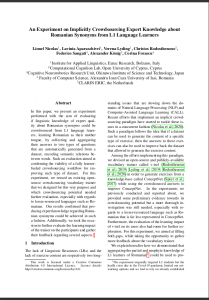 | Nicolas, Lionel; Aparaschivei, Lavinia Nicoleta; Lyding, Verena; Rodosthenous, Christos; Sangati, Federico; König, Alexander; Forascu, Corina An Experiment on Implicitly Crowdsourcing Expert Knowledge about Romanian Synonyms from Language Learners Proceedings Article In: Alfter, David; Volodina, Elena; Pilán, Ildikó; Borin, Johannes Graënand Lars (Ed.): Proceedings of the 10th Workshop on Natural Language Processing for Computer Assisted Language Learning (NLP4CALL 2021), pp. 1-14, Linköping Electronic Conference Proceedings, 2021. @inproceedings{nicolas2021,
title = {An Experiment on Implicitly Crowdsourcing Expert Knowledge about Romanian Synonyms from Language Learners},
author = {Lionel Nicolas and Lavinia Nicoleta Aparaschivei and Verena Lyding and Christos Rodosthenous and Federico Sangati and Alexander König and Corina Forascu},
editor = {David Alfter and Elena Volodina and Ildikó Pilán and Johannes Graënand Lars Borin},
url = {https://ep.liu.se/ecp/177/001/ecp2021177001.pdf},
year = {2021},
date = {2021-05-31},
booktitle = {Proceedings of the 10th Workshop on Natural Language Processing for Computer Assisted Language Learning (NLP4CALL 2021)},
journal = {Proceedings of the 10th Workshop on Natural Language Processing for Computer Assisted Language Learning (NLP4CALL 2021)},
volume = {47},
pages = {1-14},
publisher = {Linköping Electronic Conference Proceedings},
keywords = {crowdsourcing, enetCollect, Language learning},
pubstate = {published},
tppubtype = {inproceedings}
}
|
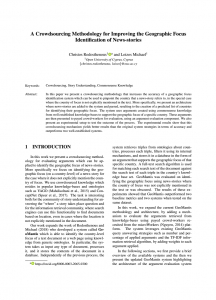 | Rodosthenous, Christos; Michael, Loizos A Crowdsourcing Methodology for Improved Geographic Focus Identification of News-Stories Proceedings Article In: Proceedings of the 13th International Conference on Agents and Artificial Intelligence, 2021. @inproceedings{rodosthenous2021,
title = {A Crowdsourcing Methodology for Improved Geographic Focus Identification of News-Stories},
author = {Christos Rodosthenous and Loizos Michael},
url = {https://www.christosrodosthenous.info/wp-content/uploads/2020/12/ICAART_2021_80_CR.pdf
https://www.scitepress.org/Papers/2021/102284/102284.pdf},
year = {2021},
date = {2021-02-04},
booktitle = {Proceedings of the 13th International Conference on Agents and Artificial Intelligence},
abstract = {Past work on the task of identifying the geographic focus of news-stories has established that state-of-the-art performance can be achieved by using existing crowdsourced knowledge-bases. In this work we demonstrate that a further refinement of those knowledge-bases through an additional round of crowdsourcing can lead to improved performance on the aforementioned task. Our proposed methodology views existing knowledge-bases as collections of arguments in support of particular inferences in terms of the geographic focus of a given news-story. The refinement that we propose is to associate these arguments with weights --- computed through crowdsourcing --- in terms of how strongly they support their inference. The empirical results that we present establish the superior performance of this approach compared to the one using the original knowledge-base.},
keywords = {crowdsourcing, Geographic Focus Identification, Information Retrieval, Natural Language Processing},
pubstate = {published},
tppubtype = {inproceedings}
}
Past work on the task of identifying the geographic focus of news-stories has established that state-of-the-art performance can be achieved by using existing crowdsourced knowledge-bases. In this work we demonstrate that a further refinement of those knowledge-bases through an additional round of crowdsourcing can lead to improved performance on the aforementioned task. Our proposed methodology views existing knowledge-bases as collections of arguments in support of particular inferences in terms of the geographic focus of a given news-story. The refinement that we propose is to associate these arguments with weights --- computed through crowdsourcing --- in terms of how strongly they support their inference. The empirical results that we present establish the superior performance of this approach compared to the one using the original knowledge-base. |
2020
|
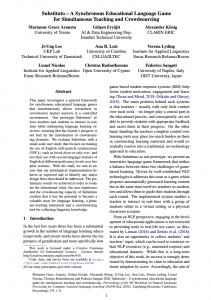 | Araneta, Marianne Grace; Eryigit, Gülsen; König, Alexander; Lee, Ji-Ung; Luís, Ana; Lyding, Verena; Nicolas, Lionel; Rodosthenous, Christos; Sangati, Federico Substituto - A Synchronous Educational Language Game for Simultaneous Teaching and Crowdsourcing Proceedings Article In: Proceedings of the 9th Workshop on Natural Language Processing for Computer Assisted Language Learning (NLP4CALL 2020), 2020. @inproceedings{marianne2020,
title = {Substituto - A Synchronous Educational Language Game for Simultaneous Teaching and Crowdsourcing},
author = {Marianne Grace Araneta and Gülsen Eryigit and Alexander König and Ji-Ung Lee and Ana Luís and Verena Lyding and Lionel Nicolas and Christos Rodosthenous and Federico Sangati},
url = {https://ep.liu.se/ecp/175/001/ecp20175001.pdf},
year = {2020},
date = {2020-11-20},
booktitle = {Proceedings of the 9th Workshop on Natural Language Processing for Computer Assisted Language Learning (NLP4CALL 2020)},
abstract = {This paper investigates a general framework for synchronous educational language games that simultaneously allows researchers to crowdsource learner answers in a controlled environment. Our prototype Substituto allows teachers and students to interact in real-time while undergoing language learning exercises; ensuring that the learner’s progress is not hurt by the introduction of crowdsourcing elements. We evaluate Substituto with a small-scale user study that focuses on training the use of English verb-particle constructions (VPCs), such as break down or take over, and test their use with second language learners of English of different proficiency levels over five pilot sessions. With the study we aim to ensure that our prototypical implementation behaves as expected and to identify any major design flaws that should be addressed. The preliminary results we achieved in order to evaluate the educational value, the user experience and the crowdsourcing capacity of XYZ-Bot confirm that it has the potential to become a valuable asset for language learning, a pleasant learning instrument and a crowdsourcing tool for collecting linguistic knowledge.},
keywords = {crowdsourcing, Language learning},
pubstate = {published},
tppubtype = {inproceedings}
}
This paper investigates a general framework for synchronous educational language games that simultaneously allows researchers to crowdsource learner answers in a controlled environment. Our prototype Substituto allows teachers and students to interact in real-time while undergoing language learning exercises; ensuring that the learner’s progress is not hurt by the introduction of crowdsourcing elements. We evaluate Substituto with a small-scale user study that focuses on training the use of English verb-particle constructions (VPCs), such as break down or take over, and test their use with second language learners of English of different proficiency levels over five pilot sessions. With the study we aim to ensure that our prototypical implementation behaves as expected and to identify any major design flaws that should be addressed. The preliminary results we achieved in order to evaluate the educational value, the user experience and the crowdsourcing capacity of XYZ-Bot confirm that it has the potential to become a valuable asset for language learning, a pleasant learning instrument and a crowdsourcing tool for collecting linguistic knowledge. |
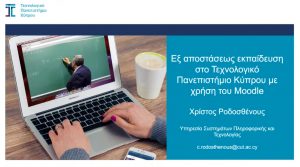 | Rodosthenous, Christos Εξ Αποστάσεως Εκπαίδευση στο Τεχνολογικό Πανεπιστήμιο Κύπρου με Χρήση του Moodle Presentation 07.11.2020. @misc{rodosthenous2020.moodle,
title = {Εξ Αποστάσεως Εκπαίδευση στο Τεχνολογικό Πανεπιστήμιο Κύπρου με Χρήση του Moodle},
author = {Christos Rodosthenous},
url = {https://youtu.be/EoRqHMFUMZE?t=17025
https://pretalx.ellak.gr/moodlemoot2020/talk/XWVWUS/},
year = {2020},
date = {2020-11-07},
booktitle = {MoodleMoot 2020},
keywords = {distance education, e-learning, eLearning Platform},
pubstate = {published},
tppubtype = {presentation}
}
|
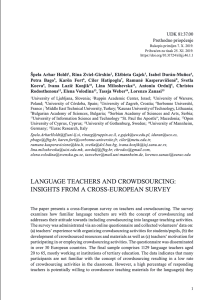 | Holdt, Špela Arhar; Zviel-Girshin, Rina; Gajek, Elżbieta; Durán-Muñoz, Isabel; Bago, Petra; Fort, Karën; Hatipoğlu, Ciler; Kasperavičienė, Ramunė; Koeva, Svetla; Konjik, Ivana Lazić; Miloshevska, Lina; Ordulj, Antonia; Rodosthenous, Christos; Volodina, Elena; Weber, Tassja; Zanasi, Lorenzo Language Teachers and Crowdsourcing: Insights from a Cross-European Survey. Journal Article In: Rasprave, vol. 46, no. 1, 2020. @article{rodosthenous_2020.4,
title = {Language Teachers and Crowdsourcing: Insights from a Cross-European Survey.},
author = {Špela Arhar Holdt and Rina Zviel-Girshin and Elżbieta Gajek and Isabel Durán-Muñoz and Petra Bago and Karën Fort and Ciler Hatipoğlu and Ramunė Kasperavičienė and Svetla Koeva and Ivana Lazić Konjik and Lina Miloshevska and Antonia Ordulj and Christos Rodosthenous and Elena Volodina and Tassja Weber and Lorenzo Zanasi},
url = {https://hrcak.srce.hr/index.php?show=toc&id_broj=19344},
year = {2020},
date = {2020-09-02},
journal = {Rasprave},
volume = {46},
number = {1},
publisher = {Institut za hrvatski jezik i jezikoslovlje},
address = {Zagreb},
keywords = {crowdsourcing, distance education, Language learning},
pubstate = {published},
tppubtype = {article}
}
|
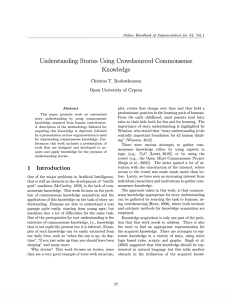 | Rodosthenous, Christos Understanding Stories Using Crowdsourced Commonsense Knowledge Journal Article In: Online Handbook of Argumentation for AI , 2020. @article{rodosthenous_2020.3,
title = {Understanding Stories Using Crowdsourced Commonsense Knowledge},
author = {Christos Rodosthenous},
url = {https://arxiv.org/pdf/2006.12020.pdf},
year = {2020},
date = {2020-06-01},
journal = {Online Handbook of Argumentation for AI },
abstract = {This paper presents work on automated story understanding by using commonsense knowledge acquired from human contributors. A description of the methodology followed for acquiring this knowledge is depicted, followed by a presentation on how argumentation is used for representing commonsense knowledge. Furthermore this work includes a presentation of tools that are designed and developed to acquire and apply knowledge for the purpose of understanding stories.},
keywords = {argumentation, Commonsense Knowledge, crowdsourcing},
pubstate = {published},
tppubtype = {article}
}
This paper presents work on automated story understanding by using commonsense knowledge acquired from human contributors. A description of the methodology followed for acquiring this knowledge is depicted, followed by a presentation on how argumentation is used for representing commonsense knowledge. Furthermore this work includes a presentation of tools that are designed and developed to acquire and apply knowledge for the purpose of understanding stories. |
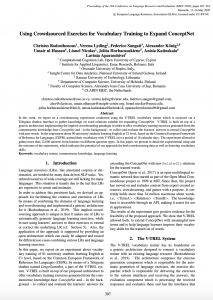 | Rodosthenous, Christos; Lyding, Verena; Sangati, Federico; König, Alexander; ul Hassan, Umair; Nicolas, Lionel; Horbacauskiene, Jolita; Katinskaia, Anisia; Aparaschivei, Lavinia Using Crowdsourced Exercises for Vocabulary Training to Expand ConceptNet Proceedings Article In: Proceedings of The 12th Language Resources and Evaluation Conference, pp. 307–316, European Language Resources Association, Marseille, France, 2020, ISBN: 979-10-95546-34-4. @inproceedings{rodosthenous-etal-2020-using,
title = {Using Crowdsourced Exercises for Vocabulary Training to Expand ConceptNet},
author = {Christos Rodosthenous and Verena Lyding and Federico Sangati and Alexander König and Umair ul Hassan and Lionel Nicolas and Jolita Horbacauskiene and Anisia Katinskaia and Lavinia Aparaschivei},
url = {https://www.christosrodosthenous.info/wp-content/uploads/2020/05/2020.lrec-1.38.pdf
https://www.aclweb.org/anthology/2020.lrec-1.38},
isbn = {979-10-95546-34-4},
year = {2020},
date = {2020-01-01},
booktitle = {Proceedings of The 12th Language Resources and Evaluation Conference},
pages = {307--316},
publisher = {European Language Resources Association},
address = {Marseille, France},
abstract = {In this work, we report on a crowdsourcing experiment conducted using the V-TREL vocabulary trainer which is accessed via a Telegram chatbot interface to gather knowledge on word relations suitable for expanding ConceptNet. V-TREL is built on top of a generic architecture implementing the implicit crowdsourding paradigm in order to offer vocabulary training exercises generated from the commonsense knowledge-base ConceptNet and -- in the background -- to collect and evaluate the learners' answers to extend ConceptNet with new words. In the experiment about 90 university students learning English at C1 level, based on Common European Framework of Reference for Languages (CEFR), trained their vocabulary with V-TREL over a period of 16 calendar days. The experiment allowed to gather more than 12,000 answers from learners on different question types. In this paper we present in detail the experimental setup and the outcome of the experiment, which indicates the potential of our approach for both crowdsourcing data as well as fostering vocabulary skills.},
keywords = {ConceptNet, enetCollect, Language learning},
pubstate = {published},
tppubtype = {inproceedings}
}
In this work, we report on a crowdsourcing experiment conducted using the V-TREL vocabulary trainer which is accessed via a Telegram chatbot interface to gather knowledge on word relations suitable for expanding ConceptNet. V-TREL is built on top of a generic architecture implementing the implicit crowdsourding paradigm in order to offer vocabulary training exercises generated from the commonsense knowledge-base ConceptNet and -- in the background -- to collect and evaluate the learners' answers to extend ConceptNet with new words. In the experiment about 90 university students learning English at C1 level, based on Common European Framework of Reference for Languages (CEFR), trained their vocabulary with V-TREL over a period of 16 calendar days. The experiment allowed to gather more than 12,000 answers from learners on different question types. In this paper we present in detail the experimental setup and the outcome of the experiment, which indicates the potential of our approach for both crowdsourcing data as well as fostering vocabulary skills. |
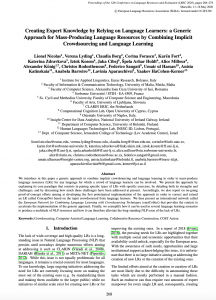 | Nicolas, Lionel; Lyding, Verena; Borg, Claudia; Forascu, Corina; Fort, Karën; Zdravkova, Katerina; Kosem, Iztok; Čibej, Jaka; Holdt, Špela Arhar; Millour, Alice; König, Alexander; Rodosthenous, Christos; Sangati, Federico; ul Hassan, Umair; Katinskaia, Anisia; Barreiro, Anabela; Aparaschivei, Lavinia; HaCohen-Kerner, Yaakov Creating Expert Knowledge by Relying on Language Learners: a Generic Approach for Mass-Producing Language Resources by Combining Implicit Crowdsourcing and Language Learning Proceedings Article In: Proceedings of The 12th Language Resources and Evaluation Conference, pp. 268–278, European Language Resources Association, Marseille, France, 2020, ISBN: 979-10-95546-34-4. @inproceedings{nicolas-etal-2020-creating,
title = {Creating Expert Knowledge by Relying on Language Learners: a Generic Approach for Mass-Producing Language Resources by Combining Implicit Crowdsourcing and Language Learning},
author = {Lionel Nicolas and Verena Lyding and Claudia Borg and Corina Forascu and Karën Fort and Katerina Zdravkova and Iztok Kosem and Jaka Čibej and Špela Arhar Holdt and Alice Millour and Alexander König and Christos Rodosthenous and Federico Sangati and Umair ul Hassan and Anisia Katinskaia and Anabela Barreiro and Lavinia Aparaschivei and Yaakov HaCohen-Kerner},
url = {https://www.christosrodosthenous.info/wp-content/uploads/2020/05/2020.lrec-1.34-1.pdf
https://www.aclweb.org/anthology/2020.lrec-1.34},
isbn = {979-10-95546-34-4},
year = {2020},
date = {2020-01-01},
booktitle = {Proceedings of The 12th Language Resources and Evaluation Conference},
pages = {268--278},
publisher = {European Language Resources Association},
address = {Marseille, France},
abstract = {We introduce in this paper a generic approach to combine implicit crowdsourcing and language learning in order to mass-produce language resources (LRs) for any language for which a crowd of language learners can be involved. We present the approach by explaining its core paradigm that consists in pairing specific types of LRs with specific exercises, by detailing both its strengths and challenges, and by discussing how much these challenges have been addressed at present. Accordingly, we also report on on-going proof-of-concept efforts aiming at developing the first prototypical implementation of the approach in order to correct and extend an LR called ConceptNet based on the input crowdsourced from language learners. We then present an international network called the European Network for Combining Language Learning with Crowdsourcing Techniques (enetCollect) that provides the context to accelerate the implementation of this generic approach. Finally, we exemplify how it can be used in several language learning scenarios to produce a multitude of NLP resources and how it can therefore alleviate the long-standing NLP issue of the lack of LRs.},
keywords = {crowdsourcing, enetCollect, Language learning},
pubstate = {published},
tppubtype = {inproceedings}
}
We introduce in this paper a generic approach to combine implicit crowdsourcing and language learning in order to mass-produce language resources (LRs) for any language for which a crowd of language learners can be involved. We present the approach by explaining its core paradigm that consists in pairing specific types of LRs with specific exercises, by detailing both its strengths and challenges, and by discussing how much these challenges have been addressed at present. Accordingly, we also report on on-going proof-of-concept efforts aiming at developing the first prototypical implementation of the approach in order to correct and extend an LR called ConceptNet based on the input crowdsourced from language learners. We then present an international network called the European Network for Combining Language Learning with Crowdsourcing Techniques (enetCollect) that provides the context to accelerate the implementation of this generic approach. Finally, we exemplify how it can be used in several language learning scenarios to produce a multitude of NLP resources and how it can therefore alleviate the long-standing NLP issue of the lack of LRs. |
2019
|
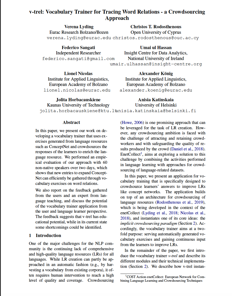 | Lyding, Verena; Rodosthenous, Christos; Sangati, Federico; ul Hassan, Umair; Nicolas, Lionel; König, Alexander; Horbacauskiene, Jolita; Katinskaia, Anisia v-trel: Vocabulary Trainer for Tracing Word Relations - An Implicit Crowdsourcing Approach Proceedings Article In: Angelova, Galia; Mitkov, Ruslan; Nikolova, Ivelina; Temnikova, Irina (Ed.): Proceedings of the International Conference Recent Advances in Natural Language Processing, RANLP 2019, pp. 675-684, Varna, Bulgaria, 2019. @inproceedings{lyding:2019:RANLP,
title = {v-trel: Vocabulary Trainer for Tracing Word Relations - An Implicit Crowdsourcing Approach},
author = {Verena Lyding and Christos Rodosthenous and Federico Sangati and Umair ul Hassan and Lionel Nicolas and Alexander König and Jolita Horbacauskiene and Anisia Katinskaia},
editor = {Galia Angelova and Ruslan Mitkov and Ivelina Nikolova and Irina Temnikova},
url = {https://www.christosrodosthenous.info/wp-content/uploads/2019/09/RANLP_2019_Paper.pdf},
year = {2019},
date = {2019-09-02},
booktitle = {Proceedings of the International Conference Recent Advances in Natural Language Processing, RANLP 2019},
pages = {675-684},
address = {Varna, Bulgaria},
abstract = {In this paper, we present our work on developing a vocabulary trainer that uses exercises generated from language resources such as ConceptNet and crowdsources the responses of the learners to enrich the language resource. We performed an empirical evaluation of our approach with 60 non-native speakers over two days, which shows that new entries to expand ConceptNet can efficiently be gathered through vocabulary exercises on word relations.
We also report on the feedback gathered from the users and an expert from language teaching, and discuss the potential of the vocabulary trainer application from the user and language learner perspective. The feedback suggests that v-trel has educational potential, while in its current state some shortcomings could be identified.},
keywords = {ConceptNet, crowdsourcing, Language learning, Natural Language Processing},
pubstate = {published},
tppubtype = {inproceedings}
}
In this paper, we present our work on developing a vocabulary trainer that uses exercises generated from language resources such as ConceptNet and crowdsources the responses of the learners to enrich the language resource. We performed an empirical evaluation of our approach with 60 non-native speakers over two days, which shows that new entries to expand ConceptNet can efficiently be gathered through vocabulary exercises on word relations.
We also report on the feedback gathered from the users and an expert from language teaching, and discuss the potential of the vocabulary trainer application from the user and language learner perspective. The feedback suggests that v-trel has educational potential, while in its current state some shortcomings could be identified. |
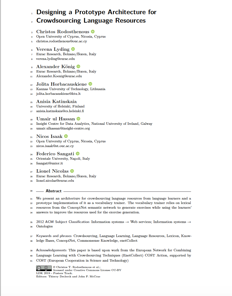 | Rodosthenous, Christos; Lyding, Verena; König, Alexander; Horbacauskiene, Jolita; Katinskaia, Anisia; ul Hassan, Umair; Isaak, Nicos; Sangati, Federico; Nicolas, Lionel Designing a Prototype Architecture for Crowdsourcing Language Resources Proceedings Article In: Declerck, Thierry; McCrae, John P. (Ed.): Proceedings of the Poster Session of the 2nd Conference on Language, Data and Knowledge (LDK 2019), pp. 17–23, CEUR, 2019. @inproceedings{enetcollect1,
title = {Designing a Prototype Architecture for Crowdsourcing Language Resources},
author = {Christos Rodosthenous and Verena Lyding and Alexander König and Jolita Horbacauskiene and Anisia Katinskaia and Umair ul Hassan and Nicos Isaak and Federico Sangati and Lionel Nicolas},
editor = {Thierry Declerck and John P. McCrae},
url = {http://ceur-ws.org/Vol-2402/paper4.pdf},
year = {2019},
date = {2019-07-10},
booktitle = { Proceedings of the Poster Session of the 2nd Conference on Language, Data and Knowledge (LDK 2019)},
volume = {Vol-2402},
pages = {17--23},
publisher = {CEUR},
abstract = {We present an architecture for crowdsourcing
language resources from language learners and a prototype implementation of it as a vocabulary trainer. The vocabulary trainer relies on lexical resources from the ConceptNet semantic network to generate exercises while using the learners' answers to improve the resources used for the exercise generation.},
keywords = {Commonsense Knowledge, ConceptNet, crowdsourcing, enetCollect, Knowledge Bases, Language learning, Language Resources, Lexicon},
pubstate = {published},
tppubtype = {inproceedings}
}
We present an architecture for crowdsourcing
language resources from language learners and a prototype implementation of it as a vocabulary trainer. The vocabulary trainer relies on lexical resources from the ConceptNet semantic network to generate exercises while using the learners' answers to improve the resources used for the exercise generation. |
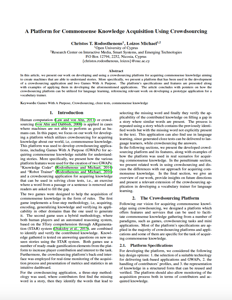 | Rodosthenous, Christos; Michael, Loizos A Platform for Commonsense Knowledge Acquisition Using Crowdsourcing Proceedings Article In: Zdravkova, Katerina; Fort, Karёn; Bédi, Branislav (Ed.): Proceedings of the enetCollect WG3 & WG5 Meeting 2018, pp. 25–30, CEUR, 2019. @inproceedings{Rodosthenous2019,
title = {A Platform for Commonsense Knowledge Acquisition Using Crowdsourcing},
author = {Christos Rodosthenous and Loizos Michael},
editor = {Katerina Zdravkova and Karёn Fort and Branislav Bédi },
url = {http://ceur-ws.org/Vol-2390/PaperB1.pdf},
year = {2019},
date = {2019-06-26},
booktitle = {Proceedings of the enetCollect WG3 & WG5 Meeting 2018},
volume = {Vol-2390},
pages = {25--30},
publisher = {CEUR},
abstract = {In this article, we present our work on developing and using a crowdsourcing platform for acquiring commonsense knowledge aiming to create machines that are able to understand stories. More specifically, we present a platform that has been used in the development of a crowdsourcing application and two Games With A Purpose. The platform’s specifications and features are presented along with examples of applying them in developing the aforementioned applications. The article concludes with pointers on how the crowdsourcing platform can be utilized for language learning, referencing relevant work on developing a prototype application for a vocabulary trainer.},
keywords = {cloze tests, Commonsense Knowledge, crowdsourcing, Games With A Purpose},
pubstate = {published},
tppubtype = {inproceedings}
}
In this article, we present our work on developing and using a crowdsourcing platform for acquiring commonsense knowledge aiming to create machines that are able to understand stories. More specifically, we present a platform that has been used in the development of a crowdsourcing application and two Games With A Purpose. The platform’s specifications and features are presented along with examples of applying them in developing the aforementioned applications. The article concludes with pointers on how the crowdsourcing platform can be utilized for language learning, referencing relevant work on developing a prototype application for a vocabulary trainer. |
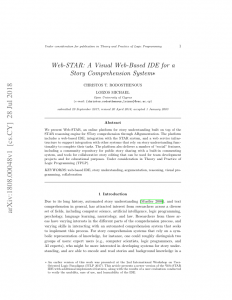 | Rodosthenous, Christos; Michael, Loizos Web-STAR: A Visual Web-Based IDE for a Story Comprehension System Journal Article In: Theory and Practice of Logic Programming, vol. 19, no. 2, pp. 317–359, 2019. @article{Rodosthenous2018d,
title = {Web-STAR: A Visual Web-Based IDE for a Story Comprehension System},
author = {Christos Rodosthenous and Loizos Michael},
url = {https://arxiv.org/abs/1808.00048
https://doi.org/10.1017/S1471068418000443
https://www.cambridge.org/core/journals/theory-and-practice-of-logic-programming/article/webstar-a-visual-webbased-ide-for-a-story-comprehension-system/4C8FBEF25DA523C19D36D625FB60E737},
doi = {10.1017/S1471068418000443},
year = {2019},
date = {2019-03-01},
journal = {Theory and Practice of Logic Programming},
volume = {19},
number = {2},
pages = {317--359},
abstract = {We present Web-STAR, an online platform for story understanding built on top of the STAR reasoning engine for STory comprehension through ARgumentation. The platform includes a web-based IDE, integration with the STAR system, and a web service infrastructure to support integration with other systems that rely on story understanding functionality to complete their tasks. The platform also delivers a number of "social" features, including a community repository for public story sharing with a built-in commenting system, and tools for collaborative story editing that can be used for team development projects and for educational purposes. },
keywords = {argumentation, collaboration, reasoning, story understanding, visual programming, web-based ide},
pubstate = {published},
tppubtype = {article}
}
We present Web-STAR, an online platform for story understanding built on top of the STAR reasoning engine for STory comprehension through ARgumentation. The platform includes a web-based IDE, integration with the STAR system, and a web service infrastructure to support integration with other systems that rely on story understanding functionality to complete their tasks. The platform also delivers a number of "social" features, including a community repository for public story sharing with a built-in commenting system, and tools for collaborative story editing that can be used for team development projects and for educational purposes. |
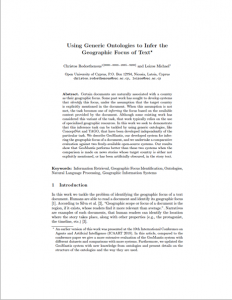 | Rodosthenous, Christos; Michael, Loizos Using Generic Ontologies to Infer the Geographic Focus of Text Journal Article In: Agents and Artificial Intelligence. ICAART 2018. Lecture Notes in Computer Science, vol. 11352, pp. 223–246, 2019, ISBN: 978-3-030-05453-3. @article{Rodosthenous2018c,
title = {Using Generic Ontologies to Infer the Geographic Focus of Text},
author = {Christos Rodosthenous and Loizos Michael},
editor = {Jaap van den Herik and Ana Paula Rocha},
url = {https://www.christosrodosthenous.info/wp-content/uploads/2018/07/Icaart2018_lnai.pdf
},
isbn = {978-3-030-05453-3},
year = {2019},
date = {2019-01-01},
urldate = {2019-01-01},
booktitle = {Agents and Artificial Intelligence},
journal = {Agents and Artificial Intelligence. ICAART 2018. Lecture Notes in Computer Science},
volume = {11352},
pages = {223--246},
publisher = {Springer International Publishing},
address = {Cham},
abstract = {Certain documents are naturally associated with a country as their geographic focus. Some past work has sought to develop systems that identify this focus, under the assumption that the target country is explicitly mentioned in the document. When this assumption is not met, the task becomes one of inferring the focus based on the available context provided by the document. Although some existing work has considered this variant of the task, that work typically relies on the use of specialized geographic resources. In this work we seek to demonstrate that this inference task can be tackled by using generic ontologies, like ConceptNet and YAGO, that have been developed independently of the particular task. We describe GeoMantis, our developed system for inferring the geographic focus of a document, and we undertake a comparative evaluation against two freely-available open-source systems. Our results show that GeoMantis performs better than these two systems when the comparison is made on news stories whose target country is either not explicitly mentioned, or has been artificially obscured, in the story text.},
keywords = {},
pubstate = {published},
tppubtype = {article}
}
Certain documents are naturally associated with a country as their geographic focus. Some past work has sought to develop systems that identify this focus, under the assumption that the target country is explicitly mentioned in the document. When this assumption is not met, the task becomes one of inferring the focus based on the available context provided by the document. Although some existing work has considered this variant of the task, that work typically relies on the use of specialized geographic resources. In this work we seek to demonstrate that this inference task can be tackled by using generic ontologies, like ConceptNet and YAGO, that have been developed independently of the particular task. We describe GeoMantis, our developed system for inferring the geographic focus of a document, and we undertake a comparative evaluation against two freely-available open-source systems. Our results show that GeoMantis performs better than these two systems when the comparison is made on news stories whose target country is either not explicitly mentioned, or has been artificially obscured, in the story text. |
2018
|
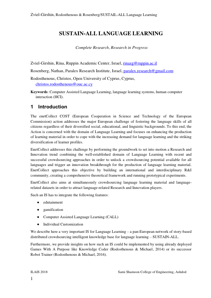 | Zviel-Girshin, Rina; Rodosthenous, Christos; Rosenberg, Nathan SUSTAIN-ALL Language Learning Conference Proceedings of the 12th Israel Association for Information Systems (ILAIS) Conference, 2018. @conference{Zviel-Girshin2018,
title = {SUSTAIN-ALL Language Learning},
author = {Rina Zviel-Girshin and Christos Rodosthenous and Nathan Rosenberg},
url = {https://www.christosrodosthenous.info/wp-content/uploads/2019/01/ILAIS_2018_paper_18.pdf},
year = {2018},
date = {2018-01-24},
booktitle = {Proceedings of the 12th Israel Association for Information Systems (ILAIS) Conference},
keywords = {Computer Assisted Language Learning, enetCollect, Human computer interaction, Language learning},
pubstate = {published},
tppubtype = {conference}
}
|
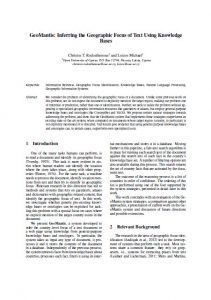 | Rodosthenous, Christos; Michael, Loizos GeoMantis: Inferring the Geographic Focus of Text using Knowledge Bases Proceedings Article In: Rocha, Ana Paula; van den Herik, Jaap (Ed.): Proceedings of the 10th International Conference on Agents and Artificial Intelligence (ICAART2018), 2018. @inproceedings{Rodosthenous2018,
title = {GeoMantis: Inferring the Geographic Focus of Text using Knowledge Bases},
author = {Christos Rodosthenous and Loizos Michael},
editor = {Ana Paula Rocha and Jaap van den Herik},
url = {https://www.christosrodosthenous.info/wp-content/uploads/2018/02/ICAART_2018_50_CR.pdf
http://www.scitepress.org/DigitalLibrary/PublicationsDetail.aspx?ID=hDHdIxIPFBU=&t=1},
year = {2018},
date = {2018-01-17},
booktitle = {Proceedings of the 10th International Conference on Agents and Artificial Intelligence (ICAART2018)},
series = {10th International Conference on Agents and Artificial Intelligence (ICAART18)},
abstract = {We consider the problem of identifying the geographic focus of a document. Unlike some previous work on this problem, we do not expect the document to explicitly mention the target region, making our problem one of inference or prediction, rather than one of identification. Further, we seek to tackle the problem without appealing to specialized geographic information resources like gazetteers or atlases, but employ general-purpose knowledge bases and ontologies like ConceptNet and YAGO. We propose certain natural strategies towards addressing the problem, and show that the GeoMantis system that implements these strategies outperforms an existing state-of-the-art system, when compared on documents whose target region (country, in particular) is not explicitly mentioned or is obscured. Our results give evidence that using general-purpose knowledge bases and ontologies can, in certain cases, outperform even specialized tools.},
keywords = {Geographic Focus Identification, Geographic Information Systems, Information Retrieval, Knowledge Bases, Natural Language Processing},
pubstate = {published},
tppubtype = {inproceedings}
}
We consider the problem of identifying the geographic focus of a document. Unlike some previous work on this problem, we do not expect the document to explicitly mention the target region, making our problem one of inference or prediction, rather than one of identification. Further, we seek to tackle the problem without appealing to specialized geographic information resources like gazetteers or atlases, but employ general-purpose knowledge bases and ontologies like ConceptNet and YAGO. We propose certain natural strategies towards addressing the problem, and show that the GeoMantis system that implements these strategies outperforms an existing state-of-the-art system, when compared on documents whose target region (country, in particular) is not explicitly mentioned or is obscured. Our results give evidence that using general-purpose knowledge bases and ontologies can, in certain cases, outperform even specialized tools. |
2017
|
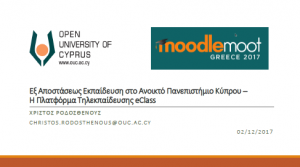 | Rodosthenous, Christos Distance Education at the Open University of Cyprus – eClass eLearning Platform Presentation 02.12.2017. @misc{Rodosthenous2017c,
title = {Distance Education at the Open University of Cyprus – eClass eLearning Platform},
author = {Christos Rodosthenous},
url = {https://moodlemoot.org/mootgr17/athens/
https://vimeo.com/album/4904562/video/248135689
},
year = {2017},
date = {2017-12-02},
keywords = {distance education, distance education tools, eLearning Platform},
pubstate = {published},
tppubtype = {presentation}
}
|
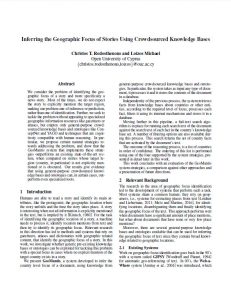 | Rodosthenous, Christos; Michael, Loizos Inferring the Geographic Focus of Stories Using Crowdsourced Knowledge Bases Workshop Cognition and Artificial Intelligence for Human-Centred Design (CAID2017), 2017. @workshop{Rodosthenous2018b,
title = {Inferring the Geographic Focus of Stories Using Crowdsourced Knowledge Bases},
author = {Christos Rodosthenous and Loizos Michael},
year = {2017},
date = {2017-08-19},
booktitle = {Cognition and Artificial Intelligence for Human-Centred Design (CAID2017)},
abstract = {We consider the problem of identifying the geographic focus of a story and more specifically a news story. Most of the times, we do not expect the story to explicitly mention the target region, making our problem one of inference or prediction, rather than one of identification. Further, we seek to tackle the problem without appealing to specialized geographic information resources like gazetteers or atlases, but employ only general-purpose crowdsourced knowledge bases and ontologies like ConceptNet and YAGO and techniques that are cognitively compatible with human reasoning. In particular, we propose certain natural strategies towards addressing the problem, and show that the GeoMantis system that implements these strategies outperforms an existing state-of-the-art system, when compared on stories whose target region (country, in particular) is not explicitly mentioned or is obscured. Our results give evidence that using general-purpose crowdsourced knowledge bases and ontologies can, in certain cases, outperform even specialized tools.},
keywords = {Geographic Focus Identification, Geographic Information Systems, Information Retrieval, Knowledge Bases, Natural Language Processing},
pubstate = {published},
tppubtype = {workshop}
}
We consider the problem of identifying the geographic focus of a story and more specifically a news story. Most of the times, we do not expect the story to explicitly mention the target region, making our problem one of inference or prediction, rather than one of identification. Further, we seek to tackle the problem without appealing to specialized geographic information resources like gazetteers or atlases, but employ only general-purpose crowdsourced knowledge bases and ontologies like ConceptNet and YAGO and techniques that are cognitively compatible with human reasoning. In particular, we propose certain natural strategies towards addressing the problem, and show that the GeoMantis system that implements these strategies outperforms an existing state-of-the-art system, when compared on stories whose target region (country, in particular) is not explicitly mentioned or is obscured. Our results give evidence that using general-purpose crowdsourced knowledge bases and ontologies can, in certain cases, outperform even specialized tools. |
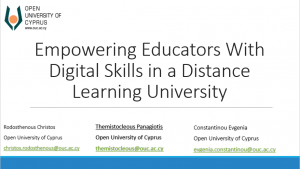 | Rodosthenous, Christos; Constantinou, Evgenia; Themistocleous, Panagiotis Empowering Educators with Digital Skills in a Distance Learning University Presentation 03.07.2017. @misc{Rodosthenous2017bb,
title = {Empowering Educators with Digital Skills in a Distance Learning University},
author = {Christos Rodosthenous and Evgenia Constantinou and Panagiotis Themistocleous},
year = {2017},
date = {2017-07-03},
series = {The 46th LIBER Annual Conference},
abstract = {Empowering Educators with digital skills in a distance learning University
The new digital era and the new learning trends, overtake the traditional model of education and training. Educators need to acquire and harness new digital skills to cultivate a more open and transparent research lifecycle. The Open University of Cyprus (OUC) is the only public higher education institution in Cyprus that offers recognized academic programmes at higher levels of education, using the open and distance learning methodology. The academic programmes offered by the OUC are international, career-oriented and fit the needs of a continuously evolving economy for the development of new skills and new career paths. These programs include undergraduate, postgraduate, PhDs and vocational training courses which are delivered online, through a state of the art eLearning platform that supports virtual classrooms, coursework submissions, content delivery and a suite of collaboration tools.
In this work, we present the methodology and infrastructure used to train and empower the educators of the Open University of Cyprus (OUC) in using the information tools, the library resources and knowledge content available, while delivering online courses to students.
Furthermore, we emphasize on the infrastructure that supports the educational methodology, which includes the eLearning Platform and the Library services. This infrastructure is also used for supporting the creation of educational content suitable for distance learning. Moreover, a detailed analysis of the training needs is presented, followed by the steps taken to design and deliver a training course appropriate for the OUC educators. This training course is delivered during the academic year and includes various formats of training material, such as electronic resources, digital objects and webinars.
In this technological environment, the OUC Library Service aims to provide a wide range of electronic as well as conventional sources such as international databases, e-Journals, e-books, digital collections and resources, offering comprehensive knowledge to its members and to the whole academic community.
Training programmes are provided, on how to use the electronic library through the eClass eLearning platform, aiming to familiarize its users in searching and retrieving data from electronic information sources, repositories and archives that the Library Service offers them access to.
In addition, distance seminars are provided to educators on how to use the “Kypseli” digital repository, search and upload theses and dissertations published throughout the academic year. In parallel, training on how to prepare their digital collections for hosting them on the digital repository is also delivered to interesting parties. Focus is also given on informing educators and researchers for publishing their work using Open Access.
The results of the training process are supported by analytics gathered during the years of application. These analytics include metrics of educational material usage, watch times for on-demand videos and participation in the online seminars.
Concluding this work, we aim in sharing our experiences of training and supporting the academic community of the OUC with the rest of the information specialist communities that share a common interest in this cause.},
keywords = {digital literacy, distance education},
pubstate = {published},
tppubtype = {presentation}
}
Empowering Educators with digital skills in a distance learning University
The new digital era and the new learning trends, overtake the traditional model of education and training. Educators need to acquire and harness new digital skills to cultivate a more open and transparent research lifecycle. The Open University of Cyprus (OUC) is the only public higher education institution in Cyprus that offers recognized academic programmes at higher levels of education, using the open and distance learning methodology. The academic programmes offered by the OUC are international, career-oriented and fit the needs of a continuously evolving economy for the development of new skills and new career paths. These programs include undergraduate, postgraduate, PhDs and vocational training courses which are delivered online, through a state of the art eLearning platform that supports virtual classrooms, coursework submissions, content delivery and a suite of collaboration tools.
In this work, we present the methodology and infrastructure used to train and empower the educators of the Open University of Cyprus (OUC) in using the information tools, the library resources and knowledge content available, while delivering online courses to students.
Furthermore, we emphasize on the infrastructure that supports the educational methodology, which includes the eLearning Platform and the Library services. This infrastructure is also used for supporting the creation of educational content suitable for distance learning. Moreover, a detailed analysis of the training needs is presented, followed by the steps taken to design and deliver a training course appropriate for the OUC educators. This training course is delivered during the academic year and includes various formats of training material, such as electronic resources, digital objects and webinars.
In this technological environment, the OUC Library Service aims to provide a wide range of electronic as well as conventional sources such as international databases, e-Journals, e-books, digital collections and resources, offering comprehensive knowledge to its members and to the whole academic community.
Training programmes are provided, on how to use the electronic library through the eClass eLearning platform, aiming to familiarize its users in searching and retrieving data from electronic information sources, repositories and archives that the Library Service offers them access to.
In addition, distance seminars are provided to educators on how to use the “Kypseli” digital repository, search and upload theses and dissertations published throughout the academic year. In parallel, training on how to prepare their digital collections for hosting them on the digital repository is also delivered to interesting parties. Focus is also given on informing educators and researchers for publishing their work using Open Access.
The results of the training process are supported by analytics gathered during the years of application. These analytics include metrics of educational material usage, watch times for on-demand videos and participation in the online seminars.
Concluding this work, we aim in sharing our experiences of training and supporting the academic community of the OUC with the rest of the information specialist communities that share a common interest in this cause. |
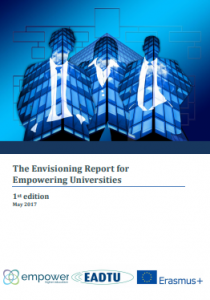 | Santos-hermosa, Gema; Rodosthenous, Christos The 7 steps to support teaching, learning and research from Digital Libraries Technical Report 2017. @techreport{Santos-hermosa2017b,
title = {The 7 steps to support teaching, learning and research from Digital Libraries},
author = {Gema Santos-hermosa and Christos Rodosthenous},
editor = {George Ubachs and Lizzie Konings and Mark Brown},
url = {http://empower.eadtu.eu/images/report/The_Envisioning_Report_for_Empowering_Universities_1st_edition_2017.pdf},
year = {2017},
date = {2017-05-01},
booktitle = {The Envisioning Report for Empowering Universities},
series = {The Envisioning Report for Empowering Universities},
keywords = {learning, library, teaching},
pubstate = {published},
tppubtype = {techreport}
}
|
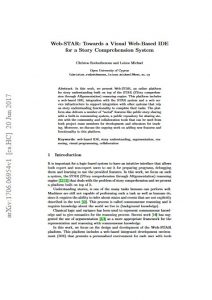 | Rodosthenous, Christos; Michael, Loizos Web-STAR : Towards a Visual Web-Based IDE for a Story Comprehension System Workshop 2nd International Workshop on User-Oriented Logic Paradigms (IULP2017), Espoo, Finland, 2017. @workshop{Rodosthenous2017b,
title = {Web-STAR : Towards a Visual Web-Based IDE for a Story Comprehension System},
author = {Christos Rodosthenous and Loizos Michael},
url = {https://arxiv.org/pdf/1706.06954.pdf
http://cognition-srv1.ouc.ac.cy/webstar/},
year = {2017},
date = {2017-01-01},
booktitle = {2nd International Workshop on User-Oriented Logic Paradigms (IULP2017)},
address = {Espoo, Finland},
abstract = {In this work, we present Web-STAR, an online platform for story understanding built on top of the STAR (STory comprehension through ARgumentation) reasoning engine. This platform includes a web-based IDE, integration with the STAR system and a web service infrastructure to support integration with other systems that rely on story understanding functionality to complete their tasks. The platform also delivers a number of "social" features like public story sharing with a built-in commenting system, a public repository for sharing stories with the community and collaboration tools that can be used from both project team members for development and educators for teaching. Moreover, we discuss the ongoing work on adding new features and functionality to this platform. },
keywords = {argumentation, collaboration, reasoning, story understanding, visual programming, web-based ide},
pubstate = {published},
tppubtype = {workshop}
}
In this work, we present Web-STAR, an online platform for story understanding built on top of the STAR (STory comprehension through ARgumentation) reasoning engine. This platform includes a web-based IDE, integration with the STAR system and a web service infrastructure to support integration with other systems that rely on story understanding functionality to complete their tasks. The platform also delivers a number of "social" features like public story sharing with a built-in commenting system, a public repository for sharing stories with the community and collaboration tools that can be used from both project team members for development and educators for teaching. Moreover, we discuss the ongoing work on adding new features and functionality to this platform. |
2016
|
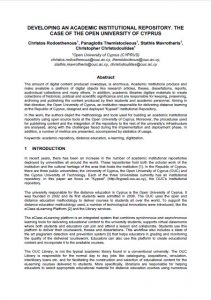 | Rodosthenous, Christos; Themistocleous, Panagiotis; Mavrotheris, Stathis; Christodoulides, Christopher Developing An Academic Institutional Repository. The Case Of The Open University Of Cyprus Proceedings Article In: Proceedings of the 8th International Conference on Education and New Learning Technologies (EDULEARN2016), pp. 1175-1183, IATED, Barcelona, Spain, 2016, ISSN: 2340-1117. @inproceedings{Rodosthenous2016c,
title = {Developing An Academic Institutional Repository. The Case Of The Open University Of Cyprus},
author = {Christos Rodosthenous and Panagiotis Themistocleous and Stathis Mavrotheris and Christopher Christodoulides},
url = {https://www.christosrodosthenous.info/wp-content/uploads/2018/02/DEVELOPING_AN_ACADEMIC_INSTITUTIONAL_REPOSITORY-preprint.pdf},
doi = {10.21125/edulearn.2016.1243},
issn = {2340-1117},
year = {2016},
date = {2016-07-01},
booktitle = {Proceedings of the 8th International Conference on Education and New Learning Technologies (EDULEARN2016)},
pages = {1175-1183},
publisher = {IATED},
address = {Barcelona, Spain},
series = {8th International Conference on Education and New Learning Technologies},
abstract = {The amount of digital content produced nowadays, is enormous. Academic institutions produce and make available a plethora of digital objects like research articles, thesis, dissertations, reports, audiovisual collections and many others. In addition, academic libraries digitize materials to create collections of historical, political or scientific significance and are responsible for keeping, preserving, archiving and publishing the content produced by their students and academic personnel. Aiming in that direction, the Open University of Cyprus, an institution responsible for delivering distance learning at the Republic of Cyprus, designed and deployed “Kypseli” Institutional repository.
In this work, the authors depict the methodology and tools used for building an academic Institutional repository using opensource tools at the Open University of Cyprus. Moreover, the procedures used for publishing content and the integration of the repository to the rest of the University’s infrastructure are analyzed, along with the challenges faced during the implementation and deployment phase.In addition, a number of metrics are presented, accompanied by statistics of usage.},
keywords = {academic repository, digitization, distance education, e-learning},
pubstate = {published},
tppubtype = {inproceedings}
}
The amount of digital content produced nowadays, is enormous. Academic institutions produce and make available a plethora of digital objects like research articles, thesis, dissertations, reports, audiovisual collections and many others. In addition, academic libraries digitize materials to create collections of historical, political or scientific significance and are responsible for keeping, preserving, archiving and publishing the content produced by their students and academic personnel. Aiming in that direction, the Open University of Cyprus, an institution responsible for delivering distance learning at the Republic of Cyprus, designed and deployed “Kypseli” Institutional repository.
In this work, the authors depict the methodology and tools used for building an academic Institutional repository using opensource tools at the Open University of Cyprus. Moreover, the procedures used for publishing content and the integration of the repository to the rest of the University’s infrastructure are analyzed, along with the challenges faced during the implementation and deployment phase.In addition, a number of metrics are presented, accompanied by statistics of usage. |
 | Rodosthenous, Christos; Michael, Loizos A Hybrid Approach to Commonsense Knowledge Acquisition Proceedings Article In: Proceedings of the 8th European Starting AI Researcher Symposium, pp. 111–122, 2016, ISBN: 9781614996828, (Best Paper Presentation Award). @inproceedings{Rodosthenous2016c,
title = {A Hybrid Approach to Commonsense Knowledge Acquisition},
author = {Christos Rodosthenous and Loizos Michael},
url = {http://ebooks.iospress.nl/volumearticle/45046
https://www.christosrodosthenous.info/wp-content/uploads/2018/04/FAIA284-0111.pdf},
doi = {10.3233/978-1-61499-682-8-111},
isbn = {9781614996828},
year = {2016},
date = {2016-01-01},
urldate = {2016-01-01},
booktitle = {Proceedings of the 8th European Starting AI Researcher Symposium},
pages = {111--122},
note = {Best Paper Presentation Award},
keywords = {commonsense knowledge acquisition, games, knowledge engineering},
pubstate = {published},
tppubtype = {inproceedings}
}
|
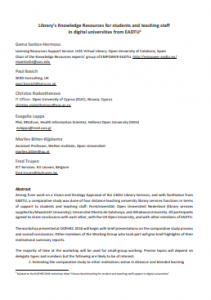 | Santos-hermosa, Gema; Basich, Paul; Rodosthenous, Christos; Lappa, Evagelia; Bitter-Rijpkema, Marlies; Truyen, Fred Library's Knowledge Resources for students and teaching staff in digital universities from EADTU Proceedings Article In: Ubachs, George; Konings, Lizzie (Ed.): Proceedings of the Online, Open and Flexible Higher Education Conference (OOFHEC2016), EADTU, Rome, 2016. @inproceedings{Santos-hermosa2016,
title = {Library's Knowledge Resources for students and teaching staff in digital universities from EADTU},
author = {Gema Santos-hermosa and Paul Basich and Christos Rodosthenous and Evagelia Lappa and Marlies Bitter-Rijpkema and Fred Truyen},
editor = {George Ubachs and Lizzie Konings},
url = {https://www.christosrodosthenous.info/wp-content/uploads/2018/02/PaperinOOFHEC2016_GSantos-Hermosa.pdf},
year = {2016},
date = {2016-01-01},
booktitle = {Proceedings of the Online, Open and Flexible Higher Education Conference (OOFHEC2016)},
publisher = {EADTU},
address = {Rome},
abstract = {Arising from work on a Vision and Strategy Appraisal of the UKOU Library Services, and with facilitation from EADTU, a comparative study was done of four distance teaching university library services functions in terms of support to students and teaching staff: FernUniversität; Open Universiteit Nederland (library services supplied by Maastricht University); Universitat Oberta de Catalunya; and Athabasca University. All participants agreed to share conclusions with each other, with the UK Open University, and with other members of EADTU. The workshop presented at OOFHEC 2016 will begin with brief presentations on the comparative study process and overall conclusions. Other members of the Working Group who took part will give brief highlights of their institutional summary reports. The majority of time at the workshop will be used for small-group working. Precise topics will depend on delegate types and numbers but the following are likely to be of interest:
1. Extending the comparative study to other institutions active in distance and blended learning
2. Integrating such studies with existing national/international review schemes for libraries, and how
to update such schemes to cater for “digital libraries”
3. How to ensure that that the library contributes to good results in benchmarking/review schemes at institution level, in particular E-xcellence and OpenUpEd.
},
keywords = {distance education},
pubstate = {published},
tppubtype = {inproceedings}
}
Arising from work on a Vision and Strategy Appraisal of the UKOU Library Services, and with facilitation from EADTU, a comparative study was done of four distance teaching university library services functions in terms of support to students and teaching staff: FernUniversität; Open Universiteit Nederland (library services supplied by Maastricht University); Universitat Oberta de Catalunya; and Athabasca University. All participants agreed to share conclusions with each other, with the UK Open University, and with other members of EADTU. The workshop presented at OOFHEC 2016 will begin with brief presentations on the comparative study process and overall conclusions. Other members of the Working Group who took part will give brief highlights of their institutional summary reports. The majority of time at the workshop will be used for small-group working. Precise topics will depend on delegate types and numbers but the following are likely to be of interest:
1. Extending the comparative study to other institutions active in distance and blended learning
2. Integrating such studies with existing national/international review schemes for libraries, and how
to update such schemes to cater for “digital libraries”
3. How to ensure that that the library contributes to good results in benchmarking/review schemes at institution level, in particular E-xcellence and OpenUpEd.
|
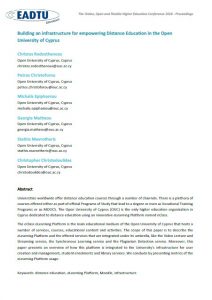 | Rodosthenous, Christos; Christoforou, Petros; Epiphaniou, Michalis; Matheou, Georgia; Mavrotheris, Stathis; Christodoulides, Christopher Building an infrastructure for empowering Distance Education in the Open University of Cyprus Proceedings Article In: Ubachs, George; Konings, Lizzie (Ed.): Proceedings of the Online, Open and Flexible Higher Education Conference (OOFHEC2016), EADTU, Rome, 2016. @inproceedings{Rodosthenous2016,
title = {Building an infrastructure for empowering Distance Education in the Open University of Cyprus},
author = {Christos Rodosthenous and Petros Christoforou and Michalis Epiphaniou and Georgia Matheou and Stathis Mavrotheris and Christopher Christodoulides},
editor = {George Ubachs and Lizzie Konings},
url = {https://www.christosrodosthenous.info/wp-content/uploads/2018/02/OOFHEC2016_FINAL_submission.pdf
http://conference.eadtu.eu/images/Proceedings/Conference_proceedings_2016_defcompressed2.pdf},
year = {2016},
date = {2016-01-01},
booktitle = {Proceedings of the Online, Open and Flexible Higher Education Conference (OOFHEC2016)},
publisher = {EADTU},
address = {Rome},
abstract = {Universities worldwide offer distance education courses through a number of channels. There is a plethora of courses offered either as part of official Programs of Study that lead to a degree or even as Vocational Training Programs or as MOOCS. The Open University of Cyprus (OUC) is the only higher education organization in Cyprus dedicated to distance education using an innovative eLearning Platform named eClass.
The eClass eLearning Platform is the main educational medium of the Open University of Cyprus that hosts a number of services, courses, educational content and activities. The scope of this paper is to describe the eLearning Platform and the offered services that are integrated under its umbrella, like the Video Lecture and Streaming service, the Synchronous Learning service and the Plagiarism Detection service. Moreover, this paper presents an overview of how this platform is integrated to the University’s infrastructure for user creation and management, student enrolments and library services. We conclude by presenting metrics of the eLearning Platform usage.},
keywords = {distance education, eLearning Platform, infrastructure, Moodle},
pubstate = {published},
tppubtype = {inproceedings}
}
Universities worldwide offer distance education courses through a number of channels. There is a plethora of courses offered either as part of official Programs of Study that lead to a degree or even as Vocational Training Programs or as MOOCS. The Open University of Cyprus (OUC) is the only higher education organization in Cyprus dedicated to distance education using an innovative eLearning Platform named eClass.
The eClass eLearning Platform is the main educational medium of the Open University of Cyprus that hosts a number of services, courses, educational content and activities. The scope of this paper is to describe the eLearning Platform and the offered services that are integrated under its umbrella, like the Video Lecture and Streaming service, the Synchronous Learning service and the Plagiarism Detection service. Moreover, this paper presents an overview of how this platform is integrated to the University’s infrastructure for user creation and management, student enrolments and library services. We conclude by presenting metrics of the eLearning Platform usage. |
2015
|
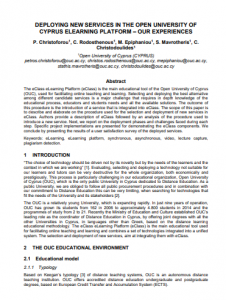 | Christoforou, Petros; Rodosthenous, Christos; Epiphaniou, Michalis; Mavrotheris, Stathis; Christodoulides, Christopher Deploying new services in the Open University of Cyprus eLearning Platform – Our experiences Proceedings Article In: Proceedings of the 9th International Technology, Education and Development Conference (INTED2015), pp. 6108–6116, IATED, 2015, ISSN: 2340-1079. @inproceedings{CHRISTOFOROU2015DEP,
title = {Deploying new services in the Open University of Cyprus eLearning Platform – Our experiences},
author = {Petros Christoforou and Christos Rodosthenous and Michalis Epiphaniou and Stathis Mavrotheris and Christopher Christodoulides},
url = {https://www.christosrodosthenous.info/wp-content/uploads/2018/02/DEPLOYING-NEW-SERVICES-IN-THE-OPEN-UNIVERSITY-OF-CYPRUS-ELEARNING-PLATFORM-–-OUR-EXPERIENCES-FINAL.pdf
https://library.iated.org/view/CHRISTOFOROU2015DEP},
issn = {2340-1079},
year = {2015},
date = {2015-01-01},
booktitle = {Proceedings of the 9th International Technology, Education and Development Conference (INTED2015)},
pages = {6108--6116},
publisher = {IATED},
series = {9th International Technology, Education and Development Conference},
abstract = {The eClass eLearning Platform (eClass) is the main educational tool of the Open University of Cyprus (OUC), used for facilitating online teaching and learning. Selecting and deploying the best alternative among different candidate services is a major challenge that requires in depth knowledge of the educational process, educators and students needs and all the available solutions. The outcome of this procedure is the introduction of a service that is integrated into eClass. The scope of this paper is to describe and elaborate on the procedure used for the selection and deployment of new services in eClass. Authors provide a description of eClass followed by an analysis of the procedure used to introduce a new service. Next, we report on the deployment phases and challenges faced during each step. Specific project implementations are presented for demonstrating the eClass components. We conclude by presenting the results of a user satisfaction survey of the deployed services.},
keywords = {asynchronous, distance education, elearning, eLearning Platform, lecture capture, plagiarism detection, synchronous, video},
pubstate = {published},
tppubtype = {inproceedings}
}
The eClass eLearning Platform (eClass) is the main educational tool of the Open University of Cyprus (OUC), used for facilitating online teaching and learning. Selecting and deploying the best alternative among different candidate services is a major challenge that requires in depth knowledge of the educational process, educators and students needs and all the available solutions. The outcome of this procedure is the introduction of a service that is integrated into eClass. The scope of this paper is to describe and elaborate on the procedure used for the selection and deployment of new services in eClass. Authors provide a description of eClass followed by an analysis of the procedure used to introduce a new service. Next, we report on the deployment phases and challenges faced during each step. Specific project implementations are presented for demonstrating the eClass components. We conclude by presenting the results of a user satisfaction survey of the deployed services. |
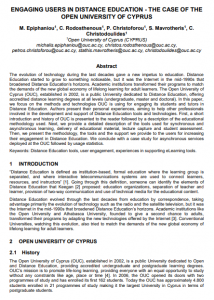 | Epiphaniou, Michalis; Rodosthenous, Christos; Christoforou, Petros; Mavrotheris, Stathis; Christodoulides, Christopher Engaging users in distance education – The case of the Open University of Cyprus Proceedings Article In: Proceedings of the 9th International Technology, Education and Development Conference (INTED2015), pp. 6092–6101, IATED, 2015, ISSN: 2340-1079. @inproceedings{EPIPHANIOU2015ENG,
title = { Engaging users in distance education – The case of the Open University of Cyprus},
author = {Michalis Epiphaniou and Christos Rodosthenous and Petros Christoforou and Stathis Mavrotheris and Christopher Christodoulides},
url = {https://www.christosrodosthenous.info/wp-content/uploads/2018/02/ENGAGING-USERS-IN-DISTANCE-EDUCATION-THE-CASE-OF-THE-OPEN-UNIVERSITY-OF-CYPRUS-tobesubmitted.pdf
https://library.iated.org/view/EPIPHANIOU2015ENG},
issn = {2340-1079},
year = {2015},
date = {2015-01-01},
booktitle = { Proceedings of the 9th International Technology, Education and Development Conference (INTED2015)},
pages = {6092--6101},
publisher = {IATED},
series = {9th International Technology, Education and Development Conference},
abstract = {The evolution of technology during the last decades gave a new impetus to education. Distance Education started to grow to something noticeable, but it was the Internet in the mid-1990s that broadened Distance Education’s horizons. Academic institutions transformed their programs to match the demands of the new global economy of lifelong learning for adult learners. The Open University of Cyprus (OUC), established in 2002, is a public University dedicated to Distance Education, offering accredited distance learning degrees at all levels (undergraduate, master and doctoral). In this paper, we focus on the methods and technologies OUC is using for engaging its students and tutors in Distance Education. Authors present their personal experiences, aiming to help other professionals involved in the development and support of Distance Education tools and technologies. First, a short introduction and history of OUC is presented to the reader followed by a description of the educational methodology used. Next, we provide a detailed description of the tools used for synchronous and asynchronous learning, delivery of educational material, lecture capture and student assessment. Then, we present the methodology, the tools and the support we provide to the users for increasing their engagement in Distance Education. We conclude with a case study for asynchronous services deployed at the OUC followed by usage statistics.},
keywords = {distance education tools, experiences in supporting elearning tool, user engagement},
pubstate = {published},
tppubtype = {inproceedings}
}
The evolution of technology during the last decades gave a new impetus to education. Distance Education started to grow to something noticeable, but it was the Internet in the mid-1990s that broadened Distance Education’s horizons. Academic institutions transformed their programs to match the demands of the new global economy of lifelong learning for adult learners. The Open University of Cyprus (OUC), established in 2002, is a public University dedicated to Distance Education, offering accredited distance learning degrees at all levels (undergraduate, master and doctoral). In this paper, we focus on the methods and technologies OUC is using for engaging its students and tutors in Distance Education. Authors present their personal experiences, aiming to help other professionals involved in the development and support of Distance Education tools and technologies. First, a short introduction and history of OUC is presented to the reader followed by a description of the educational methodology used. Next, we provide a detailed description of the tools used for synchronous and asynchronous learning, delivery of educational material, lecture capture and student assessment. Then, we present the methodology, the tools and the support we provide to the users for increasing their engagement in Distance Education. We conclude with a case study for asynchronous services deployed at the OUC followed by usage statistics. |
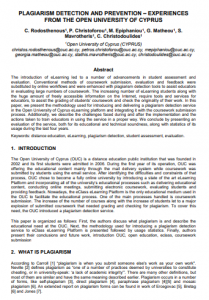 | Rodosthenous, Christos; Christoforou, Petros; Epiphaniou, Michalis; Matheou, Georgia; Mavrotheris, Stathis; Christodoulides, Christopher Plagiarism Detection and Prevention – Experiences From the Open University of Cyprus Proceedings Article In: Proceedings of the 7th International Conference on Education and New Learning Technologies (EDULEARN15), pp. 1348–1355, IATED, 2015, ISSN: 2340-1117. @inproceedings{RODOSTHENOUS2015PLA,
title = {Plagiarism Detection and Prevention – Experiences From the Open University of Cyprus},
author = {Christos Rodosthenous and Petros Christoforou and Michalis Epiphaniou and Georgia Matheou and Stathis Mavrotheris and Christopher Christodoulides},
url = {https://library.iated.org/view/RODOSTHENOUS2015PLA
https://www.christosrodosthenous.info/wp-content/uploads/2018/02/PLAGIARISM-DETECTION-AND-PREVENTION.pdf},
issn = {2340-1117},
year = {2015},
date = {2015-01-01},
booktitle = {Proceedings of the 7th International Conference on Education and New Learning Technologies (EDULEARN15)},
pages = {1348--1355},
publisher = {IATED},
series = {7th International Conference on Education and New Learning Technologies},
abstract = {The introduction of eLearning led to a number of advancements in student assessment and evaluation. Conventional methods of assignment submission, evaluation and feedback were substituted by online workflows and were enhanced with plagiarism detection tools to assist tutors in evaluating large numbers of assignments. The increasing number of eLearning students along with the huge amount of freely accessible information on the Internet, require tools and services for tutors, to assist the grading of student assignments and check the originality of their work. In this paper, we present the methodology used for introducing and delivering a plagiarism detection service in the Open University of Cyprus eLearning platform and integrating it with the assignment submission process. Additionally, we describe the challenges faced during and after the implementation and the actions taken to train tutors in using the service in a proper way. We conclude by presenting an evaluation of the service, both for its educational and technical soundness, along with statistics of its usage during the last four years.},
keywords = {distance education, e-learning, evaluation, plagiarism detection, student assessment},
pubstate = {published},
tppubtype = {inproceedings}
}
The introduction of eLearning led to a number of advancements in student assessment and evaluation. Conventional methods of assignment submission, evaluation and feedback were substituted by online workflows and were enhanced with plagiarism detection tools to assist tutors in evaluating large numbers of assignments. The increasing number of eLearning students along with the huge amount of freely accessible information on the Internet, require tools and services for tutors, to assist the grading of student assignments and check the originality of their work. In this paper, we present the methodology used for introducing and delivering a plagiarism detection service in the Open University of Cyprus eLearning platform and integrating it with the assignment submission process. Additionally, we describe the challenges faced during and after the implementation and the actions taken to train tutors in using the service in a proper way. We conclude by presenting an evaluation of the service, both for its educational and technical soundness, along with statistics of its usage during the last four years. |
2014
|
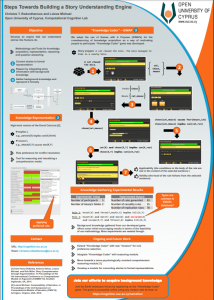 | Rodosthenous, Christos; Michael, Loizos Steps Towards Building a Story Understanding Engine Miscellaneous 2014. @misc{Rodosthenous2014,
title = { Steps Towards Building a Story Understanding Engine},
author = {Christos Rodosthenous and Loizos Michael},
url = {https://www.christosrodosthenous.info/wp-content/uploads/2018/01/kr14_poster.pdf},
year = {2014},
date = {2014-07-20},
series = {14th International Conference on Principles of Knowledge Representation and Reasoning},
keywords = {story understanding},
pubstate = {published},
tppubtype = {misc}
}
|
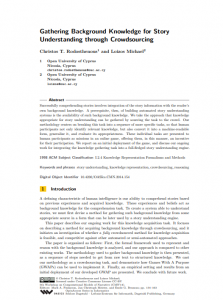 | Rodosthenous, Christos; Michael, Loizos Gathering Background Knowledge for Story Understanding through Crowdsourcing Proceedings Article In: Proceedings of the 5th Workshop on Computational Models of Narrative (CMN 2014), pp. 154–163, Schloss Dagstuhl--Leibniz-Zentrum fuer Informatik, Quebec, Canada, 2014, ISSN: 21906807. @inproceedings{Rodosthenous2014b,
title = {Gathering Background Knowledge for Story Understanding through Crowdsourcing},
author = {Christos Rodosthenous and Loizos Michael},
url = {https://www.christosrodosthenous.info/wp-content/uploads/2018/02/20.pdf
http://drops.dagstuhl.de/portals/oasics/index.php?semnr=14007},
doi = {10.4230/OASIcs.CMN.2014.154},
issn = {21906807},
year = {2014},
date = {2014-01-01},
booktitle = {Proceedings of the 5th Workshop on Computational Models of Narrative (CMN 2014)},
volume = {41},
pages = {154--163},
publisher = {Schloss Dagstuhl--Leibniz-Zentrum fuer Informatik},
address = {Quebec, Canada},
abstract = {Successfully comprehending stories involves integration of the story information with the reader's own background knowledge. A prerequisite, then, of building automated story understanding systems is the availability of such background knowledge. We take the approach that knowledge appropriate for story understanding can be gathered by sourcing the task to the crowd. Our methodology centers on breaking this task into a sequence of more specific tasks, so that human participants not only identify relevant knowledge, but also convert it into a machine-readable form, generalize it, and evaluate its appropriateness. These individual tasks are presented to human participants as missions in an online game, offering them, in this manner, an incentive for their participation. We report on an initial deployment of the game, and discuss our ongoing work for integrating the knowledge gathering task into a full-fledged story understanding engine},
keywords = {154, 2014, 4230, and phrases story understanding, cmn, crowdsourcing, digital object identifier 10, knowledge representation, oasics, reasoning},
pubstate = {published},
tppubtype = {inproceedings}
}
Successfully comprehending stories involves integration of the story information with the reader's own background knowledge. A prerequisite, then, of building automated story understanding systems is the availability of such background knowledge. We take the approach that knowledge appropriate for story understanding can be gathered by sourcing the task to the crowd. Our methodology centers on breaking this task into a sequence of more specific tasks, so that human participants not only identify relevant knowledge, but also convert it into a machine-readable form, generalize it, and evaluate its appropriateness. These individual tasks are presented to human participants as missions in an online game, offering them, in this manner, an incentive for their participation. We report on an initial deployment of the game, and discuss our ongoing work for integrating the knowledge gathering task into a full-fledged story understanding engine |
2011
|
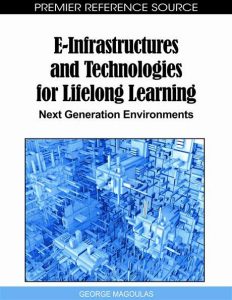 | Rodosthenous, Christos; Kameas, Achilleas; Pintelas, Panagiotis Diplek: An Open LMS that Supports Fast Composition of Educational Services Book Chapter In: Magoulas, George D (Ed.): E-Infrastructures and Technologies for Lifelong Learning: Next Generation Environments, pp. 59–89, IGI Global, 2011, ISBN: 9781615209835. @inbook{Rodosthenous2011,
title = {Diplek: An Open LMS that Supports Fast Composition of Educational Services},
author = {Christos Rodosthenous and Achilleas Kameas and Panagiotis Pintelas},
editor = {George D Magoulas},
url = {https://www.christosrodosthenous.info/wp-content/uploads/2018/02/e-infrastructure-DIPLEK-camera-ready.pdf
http://www.scopus.com/inward/record.url?eid=2-s2.0-84899383965&partnerID=tZOtx3y1},
doi = {10.4018/978-1-61520-983-5},
isbn = {9781615209835},
year = {2011},
date = {2011-01-01},
booktitle = {E-Infrastructures and Technologies for Lifelong Learning: Next Generation Environments},
pages = {59--89},
publisher = {IGI Global},
abstract = {Modern ICT has evolved through the years and is now in position of delivering educational content to specific target groups in remote locations. Advanced e-learning techniques are now used not only for delivering content to high school and university students, but can be used in lifelong training programs. Due to the target group most of these programs have (i.e. professionals with little time to spend, people of a certain age with reduced ICT skills, etc.), it is vital that organizations choose wisely among the many Learning Management Systems currently available. The purpose of this chapter is to describe and examine the features of such a platform. DIPLEK is a platform developed using service oriented architecture to enable easy access to educational content and activities for novice learners and instructors. textcopyright 2011, IGI Global.},
keywords = {},
pubstate = {published},
tppubtype = {inbook}
}
Modern ICT has evolved through the years and is now in position of delivering educational content to specific target groups in remote locations. Advanced e-learning techniques are now used not only for delivering content to high school and university students, but can be used in lifelong training programs. Due to the target group most of these programs have (i.e. professionals with little time to spend, people of a certain age with reduced ICT skills, etc.), it is vital that organizations choose wisely among the many Learning Management Systems currently available. The purpose of this chapter is to describe and examine the features of such a platform. DIPLEK is a platform developed using service oriented architecture to enable easy access to educational content and activities for novice learners and instructors. textcopyright 2011, IGI Global. |
2010
|
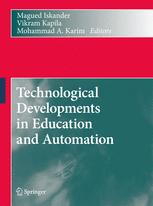 | Rodosthenous, Christos; Kameas, Achilleas; Pintelas, Panagiotis Diplek: an open educational Platform that supports the composition of learning, management and communication services Book Chapter In: Iskander, Magued; Kapila, Vikram; Karim, Mohammad A (Ed.): Technological Developments in Education and Automation, pp. 321–326, Springer Netherlands, Dordrecht, 2010, ISBN: 978-90-481-3656-8. @inbook{Rodosthenous2010,
title = {Diplek: an open educational Platform that supports the composition of learning, management and communication services},
author = {Christos Rodosthenous and Achilleas Kameas and Panagiotis Pintelas},
editor = {Magued Iskander and Vikram Kapila and Mohammad A Karim},
url = {https://www.christosrodosthenous.info/wp-content/uploads/2018/02/DIPLEK-submitted.pdf
www.springerlink.com/content/m2g8j67572w512v7},
doi = {10.1007/978-90-481-3656-8_59},
isbn = {978-90-481-3656-8},
year = {2010},
date = {2010-01-01},
booktitle = {Technological Developments in Education and Automation},
pages = {321--326},
publisher = {Springer Netherlands},
address = {Dordrecht},
abstract = {This paper presents Diplek, a Learning Management System (LMS) that addresses the needs of novice users, educators and students. The development of Diplek is based on a service oriented architecture. Among the many services offered by the platform, one can distinguish the innovative Video recording service and the Course creation service that enable instructors to import any type of Learning Object and associate it with metadata. Diplek offers a friendly user interface with dialogs and wizards that help users deal with difficult and time consuming tasks. The platforms architecture (not web-based) enables it to be deployed in both internet and internet-less communities.},
keywords = {distance education, e-learning, eLearning Platform},
pubstate = {published},
tppubtype = {inbook}
}
This paper presents Diplek, a Learning Management System (LMS) that addresses the needs of novice users, educators and students. The development of Diplek is based on a service oriented architecture. Among the many services offered by the platform, one can distinguish the innovative Video recording service and the Course creation service that enable instructors to import any type of Learning Object and associate it with metadata. Diplek offers a friendly user interface with dialogs and wizards that help users deal with difficult and time consuming tasks. The platforms architecture (not web-based) enables it to be deployed in both internet and internet-less communities. |
2006
|
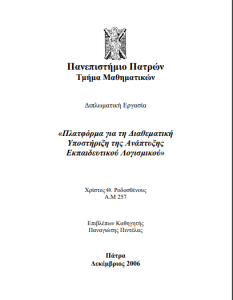 | Rodosthenous, Christos Πλατφόρμα για τη διαθεματική υποστήριξη της ανάπτυξης εκπαιδευτικού λογισμικού Masters Thesis University of Patras, 2006. @mastersthesis{Rodosthenous2006,
title = {Πλατφόρμα για τη διαθεματική υποστήριξη της ανάπτυξης εκπαιδευτικού λογισμικού},
author = {Christos Rodosthenous},
url = {http://nemertes.lis.upatras.gr/jspui/bitstream/10889/865/1/Nimertis_Rodosthenous.pdf},
year = {2006},
date = {2006-08-27},
school = {University of Patras},
abstract = {The use of information-communication technology (ICT) in the educational system is a reality of our times. Most educational institutes use computers to increase the level of understanding of their students and to enhance the learning capabilities of their educators. The purpose of this thesis is the design and development of an educational platform that uses modern ICT methods to provide the necessary tools to the educators for the creation and cataloguing of the available educational material. These tools will also help the educator to catalog the appropriate material to educational entities so that it can be understandable by the trainees. The software solution that we previously proposed involves tools to handle classes and subjects. The purpose of these tools is to enhance the capabilities of the educator to perform his duties with the best probable way. Nevertheless, this platform provides tools for the student- trainee to maximize his educational experience and training. These tools involve presentation aids, educational context administration, self-examining tests e.t.c The use of this platform gives the opportunity to the user to interact with the educational material that was pre-designed by the tutor and is presented on a friendly user interface. The educational platform can be deployed with three different ways: a ) as a standalone application, b) on an educational laboratory with the use of a server computer that contains the educational material, c) with a connection through the internet to the main server. In this way we provide the most convenient way to access the educational material. In order to achieve best performance and easiest access to the educational material we use international prototypes of metadata information, like IEEE LOM and Dublin Core, so that we can interoperate with other systems. For the development of the platform, we used tools and technologies that provide stability and interoperability. The main advantage of our platform against other available platforms is that it does not constrain the user to use a particular application in order to develop or execute the educational material, as long as he has the appropriate software installed on his computer. With this way, the educator can use any type of software that he prefers to develop the particular material.},
keywords = {LMS},
pubstate = {published},
tppubtype = {mastersthesis}
}
The use of information-communication technology (ICT) in the educational system is a reality of our times. Most educational institutes use computers to increase the level of understanding of their students and to enhance the learning capabilities of their educators. The purpose of this thesis is the design and development of an educational platform that uses modern ICT methods to provide the necessary tools to the educators for the creation and cataloguing of the available educational material. These tools will also help the educator to catalog the appropriate material to educational entities so that it can be understandable by the trainees. The software solution that we previously proposed involves tools to handle classes and subjects. The purpose of these tools is to enhance the capabilities of the educator to perform his duties with the best probable way. Nevertheless, this platform provides tools for the student- trainee to maximize his educational experience and training. These tools involve presentation aids, educational context administration, self-examining tests e.t.c The use of this platform gives the opportunity to the user to interact with the educational material that was pre-designed by the tutor and is presented on a friendly user interface. The educational platform can be deployed with three different ways: a ) as a standalone application, b) on an educational laboratory with the use of a server computer that contains the educational material, c) with a connection through the internet to the main server. In this way we provide the most convenient way to access the educational material. In order to achieve best performance and easiest access to the educational material we use international prototypes of metadata information, like IEEE LOM and Dublin Core, so that we can interoperate with other systems. For the development of the platform, we used tools and technologies that provide stability and interoperability. The main advantage of our platform against other available platforms is that it does not constrain the user to use a particular application in order to develop or execute the educational material, as long as he has the appropriate software installed on his computer. With this way, the educator can use any type of software that he prefers to develop the particular material. |






































